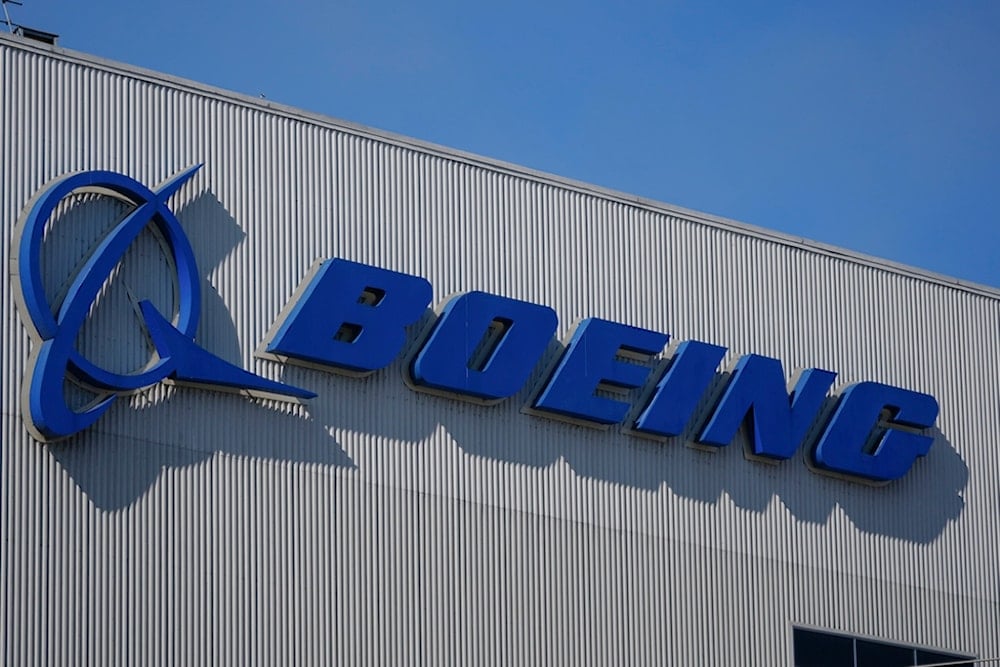China halts Boeing jet deliveries in retaliation to US tariffs
Beijing has also reportedly directed Chinese airlines to halt the purchase of aircraft-related equipment and parts from US suppliers.
-

The Boeing logo is displayed at the company's factory, September 24, 2024, in Renton, Washington (AP)
China has instructed its airlines to suspend all further deliveries of Boeing aircraft in a direct response to the United States' recent move to impose sweeping 145% tariffs on Chinese imports, Bloomberg News reported Tuesday, citing sources familiar with the matter.
The decision marks a significant escalation in the ongoing trade dispute between the world's two largest economies and delivers a fresh blow to Boeing, which has long counted China among its most important growth markets. Shares of the US planemaker fell 2% in early trading following the news.
According to the report, China's three largest carriers, Air China, China Eastern Airlines, and China Southern Airlines, had collectively planned to receive nearly 180 Boeing jets between 2025 and 2027. Those deliveries are now on hold, potentially opening the door for European rival Airbus and China’s domestic aircraft manufacturer COMAC to further expand their market share.
Halt of aircraft-related equipment
Beijing has also reportedly directed Chinese airlines to halt the purchase of aircraft-related equipment and parts from US suppliers, a move that could significantly raise maintenance costs for existing Boeing jets operating in the country.
The Chinese government is considering offering support to domestic carriers leasing Boeing aircraft, many of whom now face ballooning costs due to the ongoing trade war, Bloomberg said.
The tit-for-tat measures are the latest in a series of retaliations following the US decision to raise tariffs on Chinese goods. Last week, China responded by hiking tariffs on a range of American imports to as high as 125%, which includes commercial aircraft. Boeing has not issued a comment in response to the report.
Dwindling stock prices
The aerospace giant, still reeling from safety concerns, supply chain disruptions, and a labor strike, has already seen its stock lose over a third of its value since a mid-air door panel blowout on a new 737 MAX 9 jet in late 2024.
China was the first country to ground Boeing’s 737 MAX fleet after two fatal crashes in 2018 and 2019 killed 346 people. Although it resumed limited operations of the aircraft, Beijing had already halted most orders and deliveries by 2019.
Analysts warn that the intensifying tariff battle could severely impact trade flows between the two countries, valued at more than $650 billion in 2024, and further unsettle an already fragile global aviation sector.
China warns US tariffs bringing instability
US tariffs will “inflict serious harm” on poorer nations, China’s Commerce Minister Wang Wentao warned, according to a statement from the ministry released Saturday.
The warning came amid escalating tit-for-tat tariffs between Washington and Beijing, fueling concerns of a deepening trade war between the world’s two largest economies in a conflict that has rattled global markets.
Economists caution that disruptions in trade between the closely linked US and Chinese economies could drive up consumer prices and potentially trigger a global recession.
"These US 'reciprocal tariffs' will inflict serious harm on developing countries, especially the least developed countries, and could even trigger a humanitarian crisis," Wang told World Trade Organization chief Ngozi Okonjo-Iweala during a call on Friday, the statement said.
"The United States has continuously introduced tariff measures, bringing enormous uncertainty and instability to the world, causing chaos both internationally and domestically within the US," Wang added.
China announced Friday that it will raise tariffs on US goods to 125% but signaled it would no longer respond to any additional US levies, arguing that purchasing American products no longer makes economic sense under the current conditions.

 4 Min Read
4 Min Read








